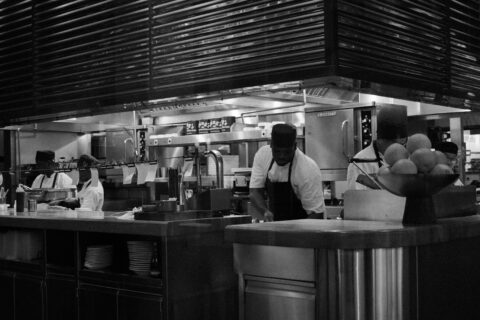Would you return to a restaurant where you got food poisoning? Probably not. Even if you were a long-time customer, it’s likely you would think twice, or even thrice, before eating there again.
That’s one of the reasons why food safety is so important in the hospitality industry.
Food Safety and Its Impact on the Hospitality Industry
Food safety impacts the hospitality industry in numerous ways, directly influencing customer satisfaction, brand reputation, and your venue’s success.
-
Customer Trust and Satisfaction: Ensuring safety in food preparation, storage, and serving builds trust in customers. Customers can feel confident in their choice to dine with you and are more likely to become repeat customers.
-
Brand Reputation: Adherence to food safety standards is an important aspect of a venue’s reputation. Any incidence of foodborne illness can tarnish the brand image, potentially leading to significant business losses and poor online reviews.
-
Regulatory Compliance: Food safety is heavily legislated. Establishments maintaining high standards are less likely to fall foul of local council inspections, thus avoiding fines or closures.
McDonald’s is known for its transparency, and routinely discloses information about their food sourcing, preparation, and safety measures to the public. This transparency builds trust with their customers, who know they can rely on the brand for safe food. McDonald’s commitment to food safety has played a significant role in sustaining its worldwide customer base and reputation.
The Risks of Not Following Proper Food Safety Protocols
The potential risks associated with laxity in implementing and maintaining proper food safety protocols in the hospitality business are numerous and severe:
-
Health Hazards: The most immediate risk is the health hazard posed to customers. Foodborne illnesses can lead to serious health complications and, in severe cases, can be fatal. Unsafe food causes about 47,900 hospitalisations and 38 deaths each year in Australia.
-
Financial Consequences: Businesses may face heavy fines or even closure for violating food safety regulations. Additionally, a business could spend a significant amount repairing its image following an incident of foodborne illness.
-
Damage to Reputation: Word of mouth travels fast, especially in this age of social media and online reviews. A single incident can cause irreparable harm to a business’s reputation, discouraging potential customers.
-
Legal Implications: Non-compliance with food safety regulations can lead to lawsuits and legal troubles that can jeopardise the future of the business.
-
Loss of Business: All of these risks translate into the potential loss of business. In a highly competitive industry, losing customers due to a lack of adherence to food safety protocols can spell the end for even well-established businesses.
Steps To Ensure Food Safety in Your Establishment
-
Training and Education: Ensure that all your employees are well-trained and educated about food safety. This includes knowledge about food-borne illnesses, proper food handling, cooking, and storage, and personal hygiene practices.
-
Follow Safe Food Handling Practices: Always follow safe food handling practices. This includes proper cooking and reheating methods to kill potential pathogens, avoiding cross-contamination, and safe food storage.
-
Proper Waste Disposal: Implement proper waste disposal methods to prevent the spread of pathogens. This includes regular cleaning of trash bins and avoiding accumulation of waste in the kitchen.
-
Regular Maintenance of Equipment: Regularly maintain all cooking and storage equipment to ensure they are functioning correctly and safely.
-
Vendor Quality Check: Ensure the quality of your raw material suppliers. Always use reputable vendors and conduct regular quality checks of the products you receive.
-
Emergency Preparedness: Have a crisis management plan in place for handling food safety incidents. This includes procedures for product recalls, handling customer complaints, and managing foodborne illness outbreaks.
Importance of Regularly Checking and Maintaining Kitchen Equipment
-
Preventive Maintenance: Regularly checking and maintaining kitchen equipment can help identify potential issues before they become serious problems, reducing the risk of unexpected breakdowns that can disrupt service.
-
Food Safety: Well-maintained equipment is less likely to contaminate food, hence it plays a crucial role in food safety. Dirty or malfunctioning equipment can harbour harmful bacteria and compromise the cleanliness of your kitchen.
-
Efficiency and Productivity: Equipment that is in good working order improves efficiency and productivity in the kitchen. Chefs can work more effectively, and food preparation processes can be completed more quickly.
-
Extend Equipment Lifespan: Routine maintenance prolongs the lifespan of kitchen equipment, representing a cost saving in the long run as it delays the need for replacement.
-
Energy Efficiency: Well-maintained equipment tends to run more efficiently, consuming less energy, which can lead to significant savings on utility bills.
-
Regulatory Compliance: In some jurisdictions, regular equipment maintenance and safety checks may be required to comply with local health and safety regulations.
Food safety is essential in the hospitality industry—it's not just about following rules, but about laying the groundwork for a thriving business. Prioritising food safety protects both customers and staff, enhances your reputation, and builds lasting loyalty. In a competitive market, a strong commitment to food safety isn’t just smart—it’s what sets your business apart.
For those in the Australian hospitality industry, you can access numerous resources to continually improve your food safety practices.
Remember, food safety is a shared responsibility. As part of the hospitality industry, we play a major role in ensuring the health and safety of our customers.
Ready to book a food safety course?




